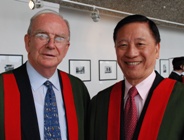Professor Ching Fai Ng

Sir John Meurig Thomas (left) with Professor Ching Fai Ng.
16 July 2009
Thursday 16 July 2009
Professor Ching Fai Ng
President and Vice-Chancellor of Hong Kong Baptist University, Chair Professor in Chemistry, Deputy of National People's Congress of China, former Nuffield Post-Doctoral Research Fellow of UW Aberystwyth, Professor Ching Fai Ng, as an Honorary Fellow of Aberystwyth by Sir John Meurig Thomas FRS.
Sir John's presentation:
Professor Ching Fai Ng
It is almost a platitude to remark that the world has benefitted enormously from the achievements of the Chinese people. Even as long ago as 1620 Francis Bacon in his famous Novum Organum wrote:
“Printing, gunpowder and compass. These three have changed the whole face and state of things throughout the world; the first is literature, the second is warfare, the third is navigation; whence have followed innumerable changes, in so much that no empire, no sect, no star seems to have exerted greater power and influence in human affairs than these mechanical discoveries”
The forebears of the gentleman who stands before you today were among the first to develop pumps for irrigation and agriculture, who, quite separately from the ancient Egyptians, introduced the shadow clocks (the forerunner of the sundial) and water clocks into daily use.
Professor Ching Fai Ng's forebears also take credit for herbal medicines and acupuncture, procedures and techniques increasingly utilized world wide to this day. The Chinese Book of Silk was the first definitive Atlas of Comets, written ca 400BC.
When European astronomers studied the stars a millennium or so ago, unlike their Chinese contemporaries, they missed many important celestial events, events that are precisely recorded in Chinese ancient texts.
It is also platitudinous to proclaim that Hong Kong is a place of extraordinary vitality and resourcefulness, one of whose leading educationalists and scientists is Professor Ng.
A man of exceptional energy, ability and vision he undertakes an enormous range of responsibilities. When we worked together at the Edward Davies Chemical Laboratories here in Aberystwyth in the 1970’s – and when we published our joint paper in the Faraday Discussion Series (in 1976), our co-authors being J.O. Williams, who later became Principal of the North East Wales Institute of Higher Education (now Glyndŵr University) and Donato Donati, now the Dean of Science at the University of Siena, Ching Fai Ng was a high flying physical scientist who had been trained at the Universities of Melbourne and British Columbia. He was Nuffield Fellow at Aberystwyth 1975-76.
In due course he became Head of Department and then Dean at Hong Kong Baptist University of which, since 2001, he is now President and Vice-Chancellor.
In addition he is the Founding President of the Beijing Normal University – Hong Kong BU United International College (UIC) in Guangdong, China.
Apart from his numerous fellowships and visiting Professorship in the U.S., France and Mainland China, he has been instrumental in creating a culturally-rich campus in Hong Kong.
His list of extraordinary activities and major initiatives is too long to detail here. Suffice it to say that, since 1998, he has sat as a Deputy at the National People’s Congress in Beijing and will continue to do so until 2013.
President Ng laid the foundation for the later formation of the School of Chinese Medicine in his University. He is actively involved in the programme for eradication of poverty by science and technology for the under privileged regions of China.
In 2005 he was awarded the Gold Bauhinia Star by the Hong Kong Special Administrative Region Government in recognition of his significant contributions to the development of Hong Kong, particularly in Higher Education and public services.
Y mae’n bleser o’r eithaf i mi i gyflwyno i chi, anrhydeddus Lywydd, gŵr sy’n arbennig o alluog, gyfeillgar, effeithiol a charedig – gŵr sy’n gyfarwydd â Phenparcau (lle bu ef a’i deulu’n byw am flwyddyn) a chanolfannau Beijing a ddinasoedd eraill Tsiena yn ogystal a’i filltir sgwâr yn Hong Kong – i’w urddo fel Gymrawd o’r Brifysgol.



